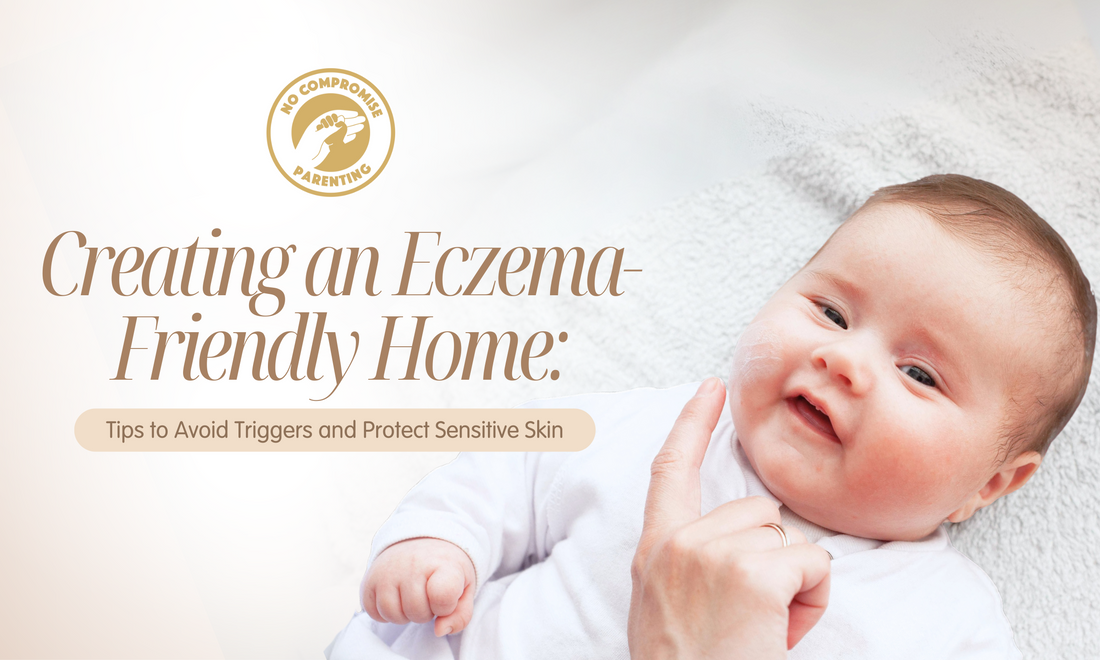Eczema is a common inflammatory skin condition that affects individuals of all ages, especially infants and children. According to the Philippine Dermatological Society, 65.1% of eczema outpatient cases involve children aged 1 to 12 years, while 24% are infants under the age of 1. Understanding how to minimize eczema triggers is crucial for parents looking to protect their child's sensitive skin.
What is Eczema?

Eczema refers to a group of conditions that cause the skin to become red, itchy, and inflamed. The most common types include:
- Atopic Dermatitis: Often linked to allergies and asthma, this is the most prevalent form of eczema.
- Contact Dermatitis: Triggered by irritants or allergens that come into contact with the skin.
- Dyshidrotic Eczema: Characterized by small, itchy blisters on the hands and feet.
- Seborrheic Dermatitis: Known as “cradle cap” in infants, it leads to scaly patches on the scalp.
Creating an Eczema-Friendly Home

Creating an eczema-friendly environment is essential for reducing flare-ups and protecting sensitive skin. Here are some effective tips:
- Opt for Soft, Breathable Fabrics: Dress your child in loose-fitting clothes made from soft, breathable materials like cotton. Steer clear of wool and synthetic fabrics that can irritate the skin.
- Establish a Soothing Bathing Routine: Bathe your child in lukewarm water for shorter durations. After bathing, apply a gentle moisturizer to lock in hydration.
- Identify and Avoid Known Triggers: Be vigilant in recognizing and minimizing exposure to common allergens and irritants such as dust mites, pet dander, and certain foods.
- Implement a Regular Cleaning Routine: Regularly dust and clean your home to reduce allergens. Wash bedding and soft toys in hot water frequently to eliminate dust mites.
- Breastfeeding: Whenever possible, breastfeeding is encouraged as it can help reduce the risk of eczema. Some infants may be allergic to formula or dairy products, which can exacerbate eczema symptoms.
- Maintain Optimal Humidity Levels: Dry air can irritate the skin. Use a humidifier to maintain moisture in the air, especially during winter months.
Choose Gentle, Fragrance-Free Products

Use mild soaps, shampoos, and lotions specifically designed for sensitive skin. Avoid products with harsh chemicals or strong fragrances. Cycles Sensitive offers a line of Fragrance-free and Certified Hypoallergenic products that are mild and safe for baby’s skin.
- Cycles Sensitive Mild Laundry Detergent 800ml
- Cycles Sensitive Head to Toe Wash 250ml
- Cycles Sensitive Baby Lotion 250ml
- Cycles Sensitive Protective Diaper Cream 80g
- Cycles Sensitive Anti Mosquito Patches 12s
Creating an eczema-friendly home is vital for managing this condition and protecting sensitive skin. By understanding eczema triggers and implementing these practical tips, parents can significantly improve their child's comfort and quality of life. For more information on eczema management and treatment options, consult a healthcare professional.
Resources
- National Eczema Association. (2020, October 22). Children & Atopic Dermatitis | National Eczema Association. https://nationaleczema.org/eczema/children/atopic-dermatitis/
- Noche-Apacible, M.-A. (2023, July 12). Atopic Dermatitis 101. Philippine Dermatological Society. Retrieved October 30, 2024, from https://pds.org.ph/atopic-dermatitis-101/
- Foisy, M., Boyle, R. J., Chalmers, J. R., Simpson, E. L., & Williams, H. C. (2011). The prevention of eczema in infants and children: an overview of Cochrane and non‐Cochrane reviews. Evidence-Based Child Health a Cochrane Review Journal, 6(5), 1322–1339. https://doi.org/10.1002/ebch.827
